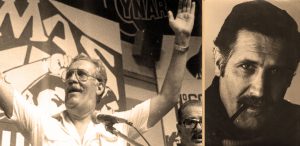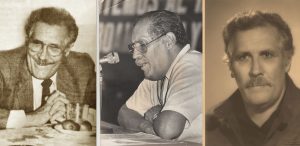“I do not think that the triumph of socialism is inevitable. I believe the result depends on the class struggle, in which we are immersed. And that, then, what is essential is to fight, to fight with rage to triumph. Because we can succeed. There is no God who has determined we cannot do it.”
Nahuel Moreno
WHO WAS NAHUEL MORENO?
THE BEGINNING
Nahuel Moreno (1924-1987) was one of the principal leaders of Latin American Trotskyism. Born in Argentina, he spent most of his life accompanying the workers and popular struggles and promoting the construction of socialist Leninist revolutionary parties. He began his political activity within the Argentine labour movement in 1943-44, with the foundation of the Marxist Workers Group (GOM). One of his first challenges was to respond to the new phenomenon of the emergence of Peronism and the massive shift of workers to it. In 1945 his small group had an outstanding performance in the meatworkers strike.
INTERNATIONALISM
In 1948 he travelled to Europe to participate for the first time in a World Congress of the Fourth International, which was founded in 1938 by Leon Trotsky. From the late 1940s and early 1950s the Trotskyist movement began to go through a long process of crisis, divisions and disintegration (caused largely by the brutal persecution suffered by Stalinism, beginning with the death of Trotsky in 1940), which has not yet been overcome. Within the Trotskyist movement Moreno was shaping a current characterized by its permanent attachment to the worker and peasant struggles of the continent. From there he polemised numerous times with the positions of another Trotskyist leader, also very well known as an economist, the Belgian Ernest Mandel (of the “United Secretariat”).
THE BUILDER
Under the leadership of Moreno numerous groups and parties in different countries stood out for their dynamism and their ongoing relationship with the processes of struggle and organization of workers. In Argentina, the party led by Moreno had several names (POR, PSRN, Palabra Obrera, PRT, PRT (La Verdad), PST (which was banned in 1976 by the dictatorship), MAS (founded in 1982). During the 1960s, while promoting the defence of the Cuban revolution, he consistently argued with the pro-guerrilla conceptions. Also in those years, in 1961, he directly accompanied the experience of peasant unionization and land seizures that led Hugo Blanco in the Peruvian valleys of Convention and Lares. During the 1970s, the PRT (La Verdad) first and then the PST, were built to defend the workers and socialist positions and polemising against the pro-guerrilla PRT–ERP (led by Mario Roberto Santucho), and the Montoneros, belonging to Peronism. In 1979, from his place of exile in Bogota he prompted the formation of the Simon Bolivar Brigade, which fought alongside the FSLN in the fight against Somoza. In 1982 he formed an international tendency, the IWL–FI (International Workers League – Fourth International), which quickly became the most dynamic of Latin American Trotskyism of those years. Upon his death in January 1987, there was a process of discussion and crisis in his current. Currently different groups still claim his legacy and trajectory.
![3[1]](https://nahuelmoreno.org/wp-content/uploads/2021/04/x31-300x146.jpg.pagespeed.ic.jlV-oXE4rm.jpg)

